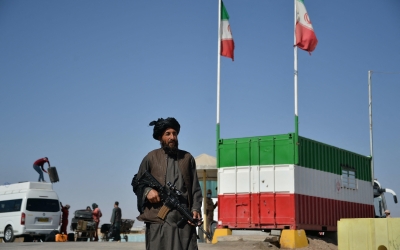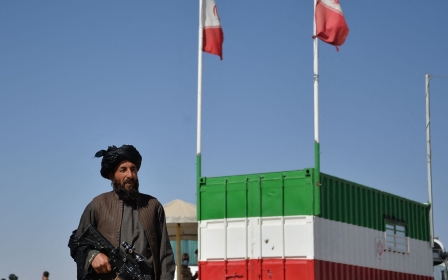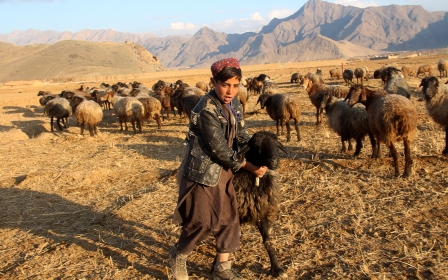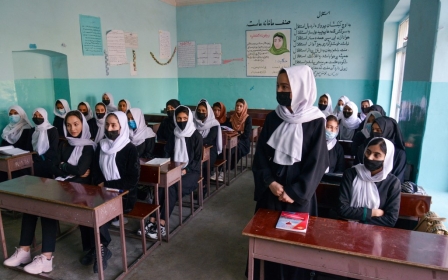Iran: Anti-Afghan sentiment is on the rise
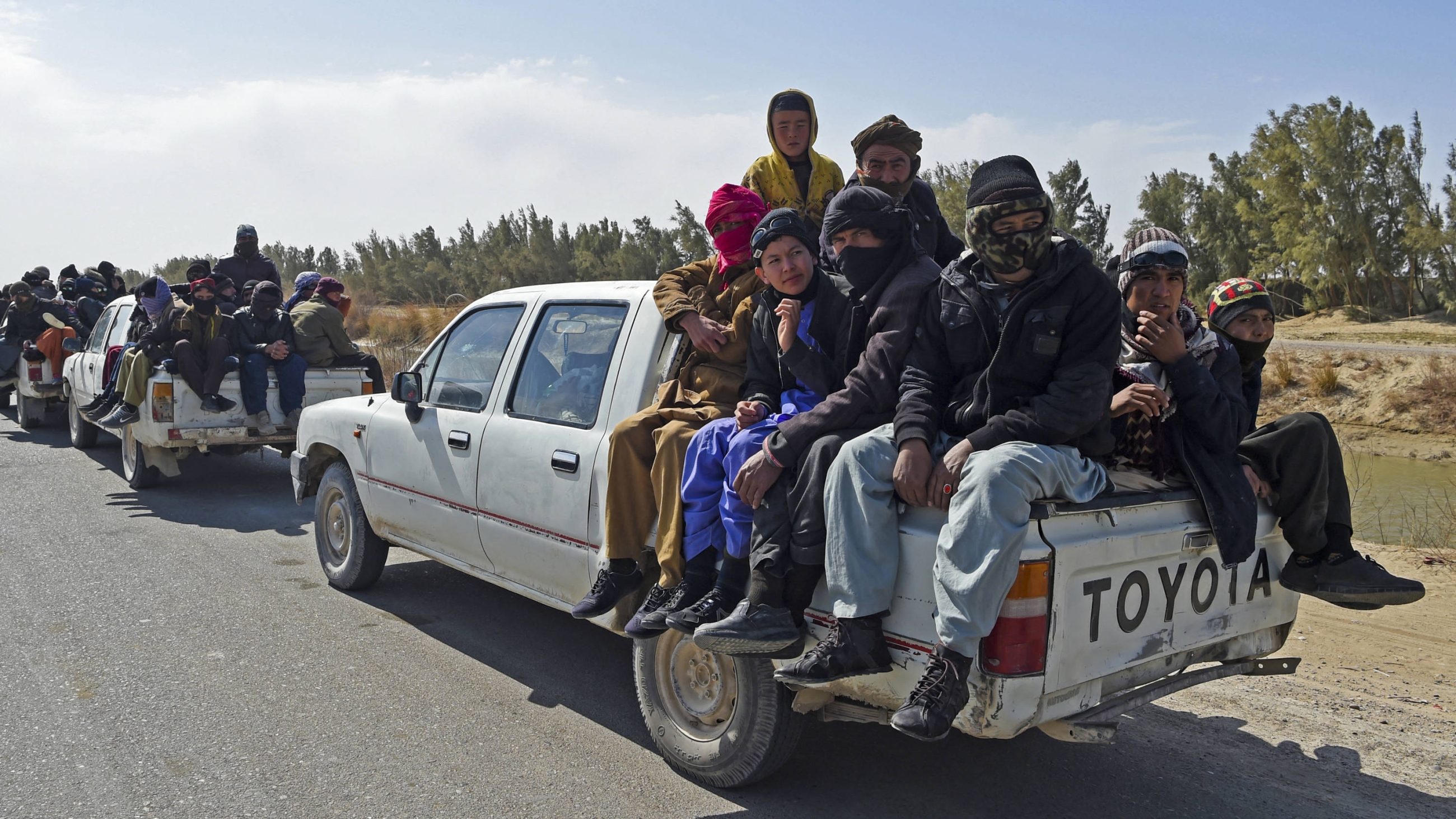
When a shrine in the city of Shiraz was hit by a militant attack earlier this month, Iranians swiftly voiced concerns about the country's security measures. But they were also quick to point the finger at the presence of Afghans in Iran, which has increasingly become a sour subject since the Taliban's return to power.
The shooting, in which four people were killed, was the second attack on the Shah Cheragh shrine, in the Fars province, in less than a year. It prompted calls for transparent investigations into potential intelligence lapses and security deficiencies.
Meanwhile, some Iranians have criticised the government's priorities and its focus on issues such as enforcing the hijab and silencing critics, instead of security.
The first attack, in October 2022, killed 15 people. The Islamic State (IS) group have claimed responsibility, and two Afghan men have been executed by hanging.
While no group has claimed responsibility for the recent shooting, Fars' governor, Mohammad Hadi Imanieh, has blamed IS, suggesting that the attack might have been a retaliation for the hangings.
New MEE newsletter: Jerusalem Dispatch
Sign up to get the latest insights and analysis on Israel-Palestine, alongside Turkey Unpacked and other MEE newsletters
At least 20 foreign nationals have been detained in connection with the second attack.
One of the militants was identified as Rahmatullah Norozov, a foreign national from Tajikistan who had undergone three months' training with IS, according to sources quoted by the Revolutionary Guard-affiliated Tasnim news agency.
Demographic changes
The reverberations from the shrine attacks have rippled through Iranian society.
The reports of terrorists receiving training in Afghanistan have heightened sensitivities in Iran. There are concerns about radicalisation among Afghan refugees, who are estimated to number five million, according to the government. The UN puts the number of registered Afghans in Iran at 780,000, and two million undocumented.
Critics of Afghan immigration, however, put the number much higher.
Against this backdrop, a growing number of voices in Iran have been urging the government to address the presence of Afghans in the country as a significant security threat.
'The Islamic Republic is seeking to alter the population composition by bringing in millions of Afghans. This would bolster their influence'
- Reformist analyst
Following the recent attack, even well-known member of parliament Nouri Qazaljeh described the influx of Afghan immigrants over the past two years as a security and economic threat.
Some Iranians also fear that the Taliban has recruited secret elements from within the Afghan community in Iran.
Meanwhile, a political activist in Iran, who wished to remain anonymous, expressed concern over radicalisation of Iranian society due to the growing number of Afghans in the country who may hold "anti-women and radical beliefs".
"For years, we battled religious extremists. Now, with seven million Afghans in Iran, marrying at 18 on average and having numerous children, the concern deepens," he said.
"The issue lies in the potential settlement and citizenship of these people in the second generation. How should we counter this cultural infiltration?"
At a time when much of the Iranian public are pushing back against religious restrictions, following the death of Mahsa Amini in the custody of morality police, some believe the government is actively encouraging the settlement of Afghans in the country.
A reformist analyst of Iranian internal politics, who asked for anonymity, said the Islamic Republic's acceptance of Afghans and their distribution across the country stems from a likely plan to effect demographic changes.
"The Islamic Republic is seeking to alter the population composition by bringing in 10 to 15 million Afghans, who are generally devout and complacent despite dire economic conditions. This would bolster their [the conservatives'] influence in the country," the analyst said.
Struggles and loyalty
Iranian authorities have imposed restrictions on Afghans in recent months. They have banned them from entering some provinces, such Kermanshah, and denied them entry to the Bam Land shopping complex near Chitgar Lake, in northwestern Tehran.
"My family and I legally came to Iran two decades ago when the Taliban targeted Shias. We, as Shias, are devoted to the Islamic Republic and not a threat to Iran," Rahim*, an Afghan residing in Tehran, told Middle East Eye.
"We are ready to sacrifice for it. I have encountered some unfriendly behaviour recently, but I choose to overlook it.
"Until a couple of years ago, Iranians were kind [to Afghans], but since the Taliban's resurgence and the influx of Afghans to Iran, frustration seems to have grown. People mistakenly think we consume their resources, like water."
Mahdi, an immigrant who claims to have collaborated with Ahmad Massoud, leader of the National Resistance Front of Afghanistan, left Afghanistan to avoid living under Taliban control.
The Persian literature graduate expressed a fondness for Iran, but lately, he said, "some Iranians would lose respect [for us] upon realising we are Afghan.
“Still there are many who respect us and even voiced their strong opposition when the ban was announced in Chitgar Lake,” said Mahdi.
Additionally, according to some reports, Afghans have also been banned by authorities from working in stores in Shiraz and Mashhad.
"We are like Iranians and share the same language. I have 11 children with me in Iran, and I am content to be here," Amanollah told MEE as he worked alongside fellow immigrants in an unfinished building.
Amanollah is apprehensive about growing anti-Afghan sentiment and restrictions, but when faced with the choice of leaving Iran for Europe and a better life, he found "that path too perilous" for him and his family.
Elsewhere, Hadi, a janitor who works in a mansion in the Tehran suburbs, said that since the recent attack in Shiraz, he has noticed a change at his employer's home.
"While my boss treats me kindly, some individuals appear tense around me or prefer to keep their distance," he said.
"There's a hint of suspicion in the way my boss sometimes looks at me. Yet, we're far from being a threat. We're simply bearing the burden of Taliban's actions."
'99 percent of Afghans residing in Iran view it as their own homeland. [They] also serve as a protective barrier against potential terrorist activities'
– Former Iranian diplomat
Meanwhile, a former Iranian diplomat stationed in Pakistan, who asked for his identity not to be revealed, told MEE, "An overwhelming 99 percent of Afghans residing in Iran view it as their own homeland.
"These individuals also serve as a protective barrier against potential terrorist activities. Iran, in essence, stands as Afghanistan's nurturing motherland," he added.
"Those who advocate for the expulsion of Afghans are either uninformed or entwined with the agenda of foreign intelligence services."
Turbulent relations
Since the Taliban's return to power in August 2021, Iran has taken a new approach to engage the group, distinct from its previous strategy. While Tehran still refrains from formally recognising the Taliban-led government in Kabul, it has allowed Taliban representatives to manage the Afghan embassy in Tehran.
This stance is reinforced by Iran's continued diplomatic presence in Kabul, along with a functional Iranian embassy and consulates in various Afghan cities.
Over the past two years, senior Taliban officials have made official visits to Iran, fostering a strong rapport between the government of Ebrahim Raisi and the Taliban administration. Additionally, Iran has become a significant economic partner for Afghanistan.
Notably, however, the security situation along their shared border has been consistently tense, with Taliban fighters and Iranian guards regularly clashing to a degree not seen under the previous Afghan government.
'Since the Taliban's resurgence and the influx of Afghans to Iran, frustration seems to have grown. People mistakenly think we consume their resources'
- Rahim, Afghan immigrant
Exacerbating the anti-Afghan sentiment has been a tension over water supplies from Afghanistan’s Helmand River - known as the Hirmand River on the Iranian side - to Iran’s Sistan and Baluchestan province.
Tehran has accused the Taliban of restricting the flow of water to Iran's eastern regions, in violation of the 1973 Helmand River Treaty, leading to shortages in the southeastern province.
“We will not allow the rights of our people to be violated,” President Ebrahim Raisi said in a stern message to the Afghan rulers on 18 May, during a visit to the province.
As tensions surrounding water rights continued to rise, fighting broke out a few days later on the border, in the region between Sistan and Baluchestan and Afghanistan's Nimroz province. Two Iranian border guards and one Taliban fighter were killed.
Iranians have previously demanded that the government use military force to stop further attacks by the Taliban.
The Raisi government's ties with the Taliban have generated many opponents in Tehran. For instance, moderate conservative newspaper Jomhuri Eslami once proposed reclaiming the Afghan embassy, a view that had gained traction among certain Iranian MPs.
Relinquishing the embassy to a “terrorist group”, the paper said, is like a black “stain” in Iran-Afghanistan relations.
*Afghans interviewed for this story used only their first names, to protect their identity.
Middle East Eye delivers independent and unrivalled coverage and analysis of the Middle East, North Africa and beyond. To learn more about republishing this content and the associated fees, please fill out this form. More about MEE can be found here.


